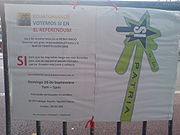
Ecuadorian constitutional referendum, 2008
Encyclopedia

Ecuador
Ecuador , officially the Republic of Ecuador is a representative democratic republic in South America, bordered by Colombia on the north, Peru on the east and south, and by the Pacific Ocean to the west. It is one of only two countries in South America, along with Chile, that do not have a border...
on 28 September 2008 to ratify or reject the constitution drafted by the Ecuadorian Constituent Assembly
Ecuadorian Constituent Assembly
The Ecuadorian Constituent Assembly was a 2007-2008 constitutional assembly in Ecuador, which drafted the 2008 Constitution of Ecuador, approved via the Ecuadorian constitutional referendum, 2008....
elected in 2007
Ecuadorian Constituent Assembly election, 2007
On 30 September 2007 an election for a Constituent Assembly was held in Ecuador following the referendum on this issue successfully held on 15 April 2007...
. Partial results show that 64% of voters voted to approve the new constitution.
President Rafael Correa
Rafael Correa
Rafael Vicente Correa Delgado born is the President of the Republic of Ecuador and was the president pro tempore of the Union of South American Nations. An economist educated in Ecuador, Belgium and the United States, he was elected President in late 2006 and took office in January 2007...
had initially stated he would resign if the constitution were rejected, but later stated he would finish his term. A poll from May 2008 saw 41% to 31% in favour of the constitution draft. Provisions include the right to healthcare, food, social security, and education as well as an emphasis on Latin American integration.
As the new constitution was approved, early elections on all levels were likely to be held in early 2009.
The EU sent an election observation team.
The more controversial proposals include allowing a second four-year term for the president and legalising civil unions.

